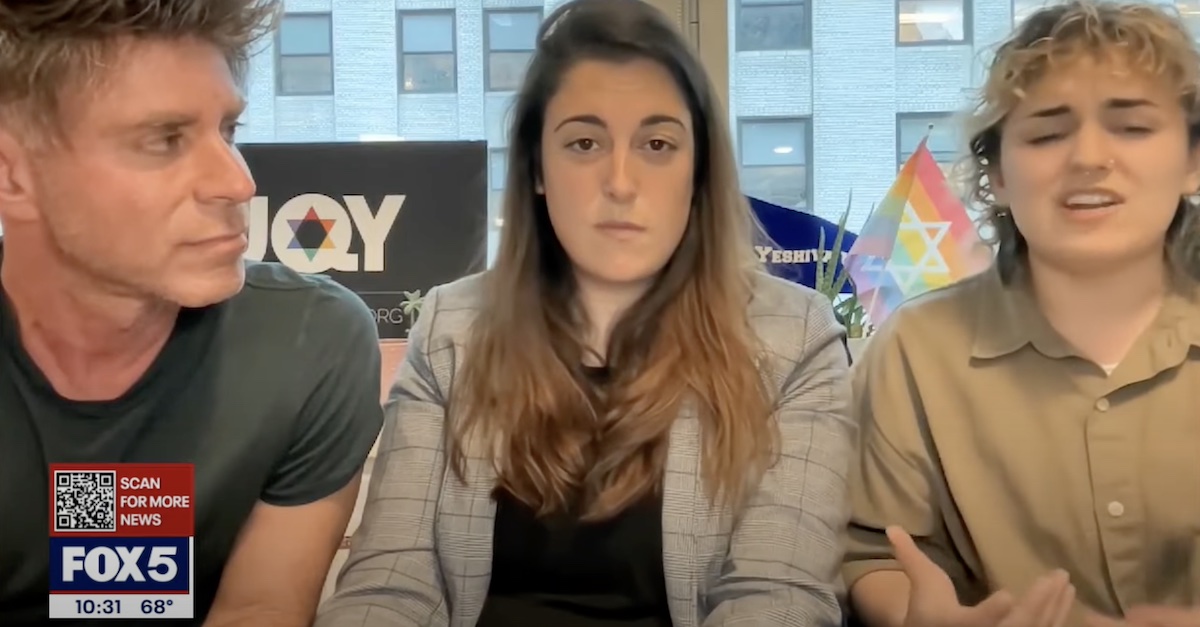
Yeshiva University students discuss the importance of an LGBTQ club on campus.
The Supreme Court on Friday agreed to temporarily block a judge’s order forcing Yeshiva University to recognize a club for lesbian, bisexual, gay, transgender and queer students, until the school’s religious freedom claims can be adjudicated.
Signed by Justice Sonia Sotomayor, the order for a stay has no noted dissents — and does not represent the high court’s final word on the matter. The order bears Sotomayor’s signature because she is the circuit justice for the Second Circuit, whose jurisdiction includes New York.
Yeshiva is an Orthodox Jewish university in New York, and not all of the schools within its system agree with the decision refusing to recognize a “Pride Alliance” for students on campus.
Cardozo School of Law distanced itself from the university’s Supreme Court battle when Yeshiva first filed an emergency application for a stay last month.
“The University’s decision not to allow an undergraduate LGBTQ+ student group, the lawsuit and the pending application at the Supreme Court do not pertain to the Cardozo School of Law and will have no impact on law school policy,” Cardozo wrote in a statement on Aug. 29. “The university’s position is that the undergraduate schools, unlike the law school, include religious education as a fundamental part of the curriculum.
“Cardozo embraces the fundamental human dignity of our LGBTQ+ students,” their statement continues. “The law school has a deep and steadfast commitment to diversity, equality and inclusion and recognizes that LGTBQ+ students play a critical role in our community. The law school has always supported our student LGBTQ+ organization, OUTlaw, and its alumni, and will continue to do so. At Cardozo, we believe that inclusion and equality are cornerstones of legal education and that diversity advances the best interests of the legal system.”
The high court’s order temporarily lifts an injunction ordered by New York Supreme Court Justice Lynn Kotler, who ruled against Yeshiva.
According to Kotler’s order, Yeshiva was not organized as a registered as a religious institution at the time of its incorporation. She wrote that “Yeshiva’s organizing documents do not expressly indicate that Yeshiva has a religious purpose” — and called the school’s arguments against the club “overblown.”
“Even if the court were to adopt Yeshiva’s religious function test, the court would reach the same result,” Kotler’s ruling states. “Plaintiffs’ counsel correctly characterizes defendants’ argument on this point: defendants want this court to find that Yeshiva is a religious corporation in the same manner an ordinary person would describe themselves as a religious person. There is no doubt that Yeshiva has an inherent and integral religious character which defines it and sets it apart from other schools and universities of higher education. However, Yeshiva must fit within the term ‘religious corporation’ as the legislature intended the term to mean in the [New York City Human Rights Law].”
The judge rejected Yeshiva’s claim that the city’s human rights law targeted religious practice.
“It does not target religious practice, its intent is to deter discrimination, only, and it applies equally to all places of public accommodation other than those expressly exempted as distinctly private or a religious corporation organized under the education or religious corporations law,” the ruling states.
The university is represented by attorneys for the Becket Fund for Religious Liberty.
(Image via Fox 5/screengrab)